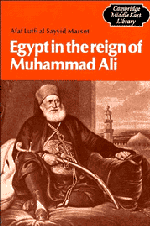Book contents
- Frontmatter
- Contents
- Dedication
- Preface
- Note on transliteration
- 1 Egypt under the mamluks
- 2 Muhammad Ali the man
- 3 A country without a master
- 4 Master in his own house
- 5 Family, friends and relations
- 6 Internal policies
- 7 Agricultural changes
- 8 Industry and commerce
- 9 Expansion to what end?
- 10 The undoing: Muhammad Ali and Palmerston
- 11 The aftermath
- 12 Conclusion
- Notes
- Glossary of Arabic and Turkish terms
- Select bibliography
- Index
6 - Internal policies
Published online by Cambridge University Press: 04 April 2011
- Frontmatter
- Contents
- Dedication
- Preface
- Note on transliteration
- 1 Egypt under the mamluks
- 2 Muhammad Ali the man
- 3 A country without a master
- 4 Master in his own house
- 5 Family, friends and relations
- 6 Internal policies
- 7 Agricultural changes
- 8 Industry and commerce
- 9 Expansion to what end?
- 10 The undoing: Muhammad Ali and Palmerston
- 11 The aftermath
- 12 Conclusion
- Notes
- Glossary of Arabic and Turkish terms
- Select bibliography
- Index
Summary
Muhammad Ali conceived of Egypt as a mulk, a possession he had won by the sword. A legitimate monarch can take his time in planning for the future, secure - sometimes - in his knowledge that continuity will prevail. Muhammad Ali was neither a legitimate monarch, nor was he even secure, and he had strong doubts about any continuity for his line unless he took steps to establish and institute such continuity, by the sword if necessary. His actions were geared towards improving his mulk and making it yield greater profits, and towards establishing firm foundations for its government that would resist change and time. Such foundations led to the creation of a centralized bureaucracy, and involved a series of ad hoc decisions in response to circumstances, which in the final analysis created the trappings of a modern state. It was a piecemeal progression, a series of trials and errors that established a centralized authority, brought about a control of trade and commerce, the total reform of agriculture, the establishment of industry, and finally expansion beyond the frontiers of his territory.
The corner-stone of Muhammad Ali's internal policy in Egypt was law and order. That was the prime reason for which he had been supported by ulama and tujjar, who saw in him a potential Ali Bey ushering in a period of stability and security wherein they could go about their business.
- Type
- Chapter
- Information
- Egypt in the Reign of Muhammad Ali , pp. 100 - 136Publisher: Cambridge University PressPrint publication year: 1984

